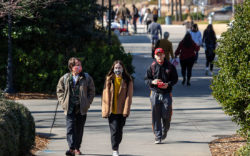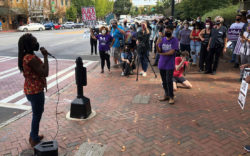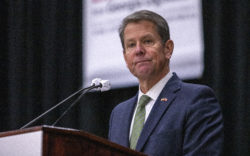On Oct. 26, two Philadelphia police officers responded to a call for help at the residence of Walter Wallace Jr., a 27-year-old Black man who struggled with mental health issues. Wallace walked toward the officers while holding a knife. In response, the officers fired 14 bullets at him, according to The Philadelphia Inquirer. His death has led to massive demonstrations across Philadelphia, as protesters call for an end to police brutality.
More than 700 miles south of Philadelphia, the same group of University of Georgia students who led marches through downtown Athens and down Milledge Avenue earlier this year held a vigil at the Arch on Friday, Oct. 30, to stand in solidarity with Wallace and others in the U.S. and abroad who have lost their lives during encounters with law enforcement. After speaking about the state of policing and challenges that Black communities face in the U.S. and Nigeria, about 30 participants lit candles, gathered in a circle and chanted the names of those who were killed by law enforcement.
Among the names of Wallace, George Floyd, Breonna Taylor and Ahmaud Arbery, the demonstrators also chanted the names of Timmy Patmon and London Best. An Athens-Clarke County police officer hit Patmon with a police car in 2018, and police officers pinned Best to the ground and shocked him with a stun gun outside of a downtown bar in September.
Zac Lundyn, a private school teacher and UGA graduate, traveled to Athens to explain why he quit teaching in public schools. While working at a public school, Lundyn said he felt he was “perpetuating the policing of students” and contributing to the school-to-prison pipeline system, in which disadvantaged children overwhelmingly end up incarcerated.
Lundyn also railed against “cloutivists,” people who hop on a “trendy wave when it has to do with activism and human rights and then [go] right back to regular life, continuing as if nothing happened,” he said. Lundyn used Blackout Tuesday, in which social media users posted photos of black squares in solidarity with Black Lives Matter in June, as an example of “cloutivism.” The action faced criticism online for its potential to bury Black voices, but Lundyn also noted that many people posted the photo without participating in other forms of activism. People need to research the issues that Black communities face and make changes in their everyday lives to avoid “cloutivism,” Lundyn said.
Hayes Taylor, a white UGA student who has helped plan several recent protests, said it’s important for white activists to take a step back and ask people of color how they can help advance racial equality. After soliciting their advice, Taylor said white people need to follow through with it. “It’s pretty simple,” Taylor said. “Listen to what people of color want and support that way.”
Protests against police brutality occurred across the nation this year, but they aren’t limited to the U.S. Nigeria formed the Special Anti-Robbery Squad, a unit of the Nigerian police known as SARS, in 1992 to crack down on robbery, kidnapping and other violent crimes. Most of its officers do not wear uniforms or name tags to identify themselves, and SARS is known for extortion, extrajudicial killings, mock execution and other violent behaviors.
Fed up with the violent nature of the police, young Nigerian demonstrators took to the streets of Lagos, the capital, to protest against police brutality as part of the #EndSARS movement. Nigeria’s Inspector General for Police Mohammed Adamu disbanded SARS for the fourth time in October, but a similar unit, known as SWAT, was created in its place. On Oct. 20, military officers killed dozens and wounded many peaceful unarmed protesters in Lagos.
As a predominately Black nation, Nigerians face profiling on the basis of class rather than race, said a speaker who identified herself as Kendra, a UGA student, but declined to share her last name. “As a Black woman, I can’t usually be out this late,” said Kendra, who has family in Nigeria. “The fear is the same [in Nigeria]. The only thing I can say that’s slightly different is Nigeria is all Black, for the most part, but there’s still another form of discrimination happening, and I think that’s the problem we’re all trying to stand up for.”
Athens-Clarke County Commissioner Mariah Parker said activists must stand with other nations around the world, and she called for an end to the police state. With only a few days left in the 2020 U.S. election cycle, Parker encouraged participants at the vigil to vote for progressive candidates who vow to “defund the police.”
Like what you just read? Support Flagpole by making a donation today. Every dollar you give helps fund our ongoing mission to provide Athens with quality, independent journalism.









